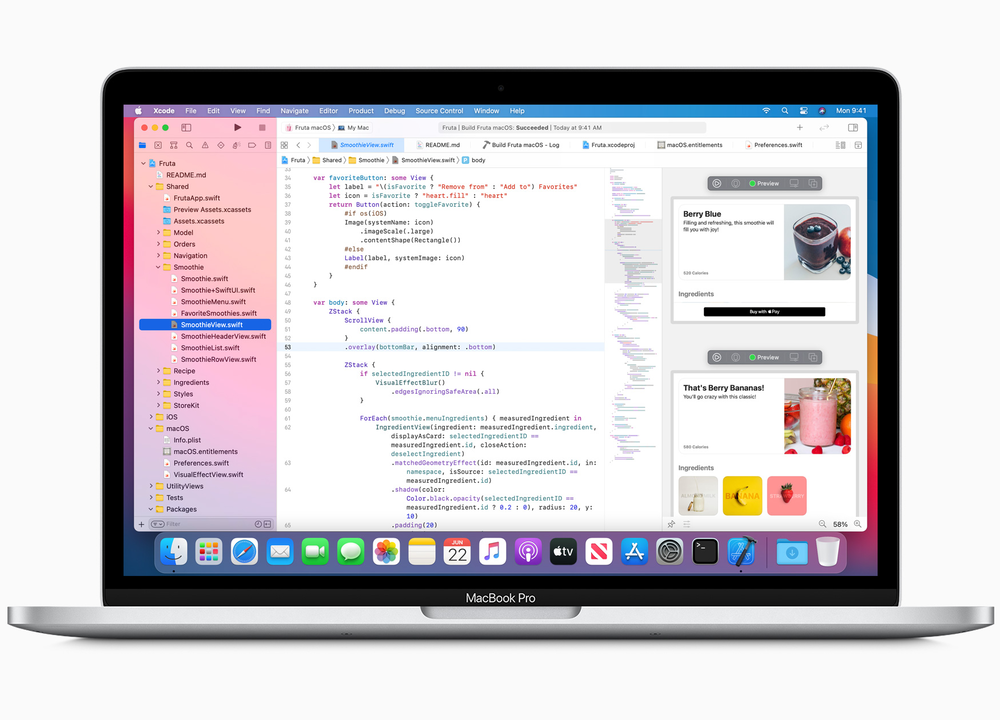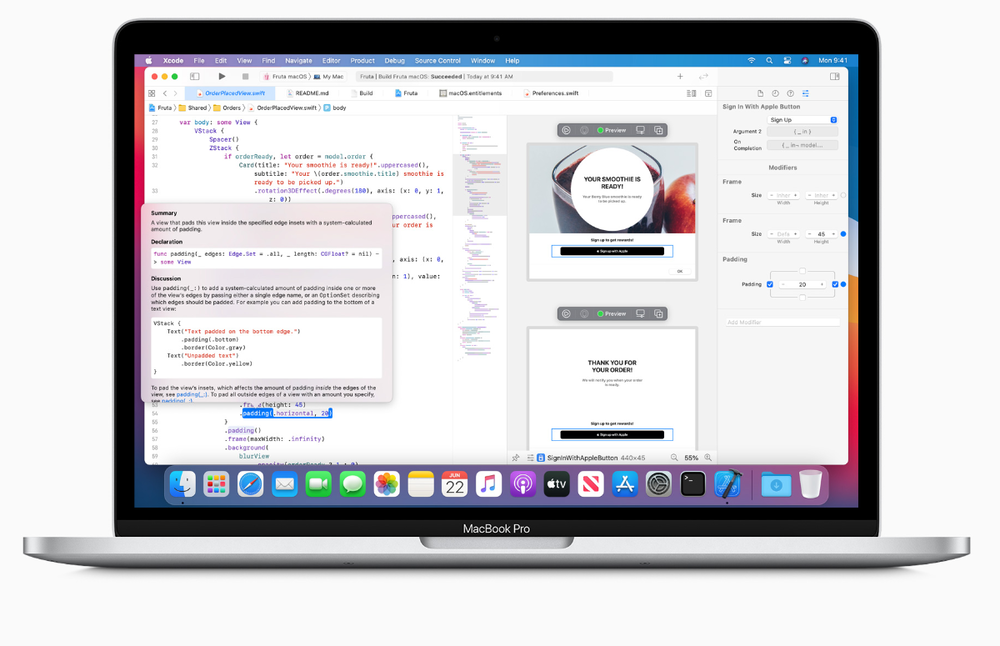At this week’s (virtual) 2020 Worldwide Developer Conference, Apple announced a line-up of new technologies for its 23 million developers.
These new tools will enable developers to bring more powerful app experiences to Apple’s industry-leading platforms, and help them better manage and grow their businesses, according to Phil Schiller, Apple’s senior vice president of Worldwide Marketing. In addition to Apple’s annual developer survey, WWDC20 will feature an online App Store lab so that developers from around the world can share their feedback and help inform future improvements to the App Store. Apple is also adding new forums for developers to relay suggestions throughout the coming year and beyond.

With App Clips, users have a way to discover apps through new visual indicators called App Clip codes, as well as through NFC, shared links, and more. Schiller says App Clips launch within a few seconds. Once inside the App Clip, users can install the full app with a single tap if they wish.
Widgets have also been redesigned to be more helpful and give users timely info at a glance. With widgets on the Home Screen pages, users can experience the developer’s widget every time they look at their device. And with a new SwiftUI application programming interface (API), developers can use the same code to build a widget for iOS, iPadOS, and macOS.
This year, Apple is providing developers with even more ways to deeply integrate their apps into core platform features in order to deliver powerful functionality in a way that also protects user privacy and security, says Schiller. The new Find My network accessory program lets third-party device makers take advantage of a network with hundreds of millions of devices, while continuing to offer end-to-end encryption so only the user can see the location of their item.
HomePod also has a new program to integrate third-party music services. Email and browser app developers can offer their apps as default options, selectable by users. And Safari for Mac is adding support for the WebExtensions API used by Chrome, Firefox, and Edge. The goal? To make it easier for extension developers to work with Safari, and distribute through the Mac App Store.
A new StoreKit tool in Xcode lets developers simulate subscription setup, in-app purchases, and even refunds — all locally on their Mac. There is also a new StoreKit testing framework that makes it easy for developers to automate testing of purchase workflows.
New App Store server notifications for subscription renewal events and customer refunds help developers better manage the customer experience in their apps. In addition to shared family app purchases, the App Store now supports Family Sharing for subscriptions and in-app purchases.
Schiller says it’s now easier for developers to make their games shine on Apple’s platforms using the latest updates to the redesigned Game Center. Updates include recurring leaderboards, a new in-game dashboard, and enhanced recommendations through Friends Playing, where users can discover games that are popular with their Game Center friends.
Xcode is at the center of all development on Apple’s platforms, and with Xcode 12, it has a fresh new look to match macOS Big Sur. New document tabs make opening multiple files fast and lightweight to support interface files, and logs and project files each open in their own tab. N
Navigator fonts now match the system size, or can be set to small, medium, or large. And Xcode 12 builds macOS Universal apps by default to support new Macs with Apple silicon.
Schiller says that SwiftUI introduced developers to a modern UI [user interface] framework that made it more intuitive than ever to build sophisticated app UIs. This year, new life cycle APIs let developers write an entire app in SwiftUI, and share that code across all Apple platforms. Developers who have already started with SwiftUI will be able to add new features to their existing cod.

Debuting alongside macOS Catalina at WWDC 2019, Mac Catalyst made it easy for developers to bring their iPad apps to the Mac. With macOS Big Sur, Mac Catalyst apps automatically inherit the spacious new design, while giving developers new APIs and greater control over the behavior of their apps, Schiller says.
Also, developers can choose to keep their Mac app scaled at a resolution to match their iPad app, or take total control of their Mac interface to create a custom Mac experience.
During WWDC20, Apple is also launching an online version of the App Store lab to further support the Apple developer community across all of its platforms. In the past, the in-person App Store lab has helped inform and prioritize new App Store features and capabilities, as well as updates to App Store policies.
This year, developers are encouraged to share their feedback at the virtual lab or through an additional survey channel which will collect submissions through June 26. Schiller says the survey, now in its fourth year, reaches half a million developers and represents a critical pathway of feedback for improvements leading to App Store developer services such as TestFlight public links and the ability to respond to customer reviews.
According to Schiller, other developer features include:
-
ARKit 4 introduces new ways to capture information about the real world using a new Depth API that is designed to work with the LiDAR sensor in iPad Pro, enabling entirely new types of apps, such as on-site architecture, design, landscaping, and manufacturing.
-
Machine learning development is easier and more extensive with additional tools in Core ML for model deployment and encryption, new templates and training capabilities in Create ML, and more APIs for vision and natural language.
-
PencilKit now features Scribble, which makes it easy to create apps with text entry fields that users can write in with Apple Pencil. Developers will also have access to stroke data using PencilKit, all while seamlessly handling both Apple Pencil input and system touch gestures.
-
Swift Package Manager adds support for resources to easily share Asset Catalog bundles and localizations. And new open source packages for Numerics, ArgumentParser, and System make Swift a great language for more use cases.
-
TestFlight now supports up to 100 team members for fast build distribution.
-
AirPods Motion API gives developers access to movement data in real time.
-
Developers can now enable users to upgrade existing third-party app accounts to Sign in with Apple accounts.
